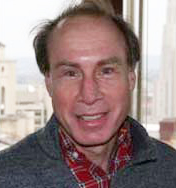
Raffi Khatchadourian is a staff writer at The New Yorker. In preparing his article, “Degrees of Freedom,” Mr. Khatchadourian interviewed McGowan Institute for Regenerative Medicine faculty member Andrew Schwartz, PhD, Professor of Neurobiology at the University of Pittsburgh, and several of Dr. Schwartz’s clinical colleagues and their patients.
“Degrees of Freedom” begins outside Minneapolis where Dr. Schwartz grew up and later attended the University of Minnesota. During his studies, the work of Paul Fitts, PhD, a psychologist at Wright-Patterson Air Force Base in the 1950’s, caught Dr. Schwartz’s attention. While trying to figure out the best design for a cockpit, Dr. Fitts had learned that the way a pilot’s arm reached for an instrument or a dial on a control panel could be precisely captured by an equation that took into account the target’s size and distance. Fitts’s law, as it was known, seemed to reveal a hidden mathematical order in the workings of the body. “That was the part that just hooked me,” Dr. Schwartz said. He decided to pursue a PhD in neurophysiology, staying on at Minnesota.
From Minnesota, Dr. Schwartz’s post-doctoral work and career had him crisscrossing the United States: Johns Hopkins University in Maryland, Barrow Neurological Institute and Arizona State University in Arizona, and University of Pittsburgh in Pennsylvania. It was when he was at Pitt that the Defense Advanced Research Projects Agency (DARPA) had decided to launch the most ambitious effort in history to give people mastery of brain-controlled robotics, and it was curious whether he was interested in participating.
Mr. Khatchadourian takes the reader through DARPA’s focus, Dr. Schwartz’s pre-clinical research and laboratory work, and how the two became integrated. The clinical work this led to is highlighted extensively with in-depth interviews with patients, Jan Scheuermann and Nathan Copeland.
Today, the Pittsburgh researchers have secured millions of dollars from the NIH to continue and expand their project. Dr. Schwartz, meanwhile, has resumed his quest to decode the cognition of movement. The more he delves into the brain, he told Mr. Khatchadourian, the more complicated it appears. Dr. Schwartz’s scientific journey that began with an investigation of the cognitive laws of motion was now leading him to new questions.
Read the entire fascinating article from The New Yorker here.
